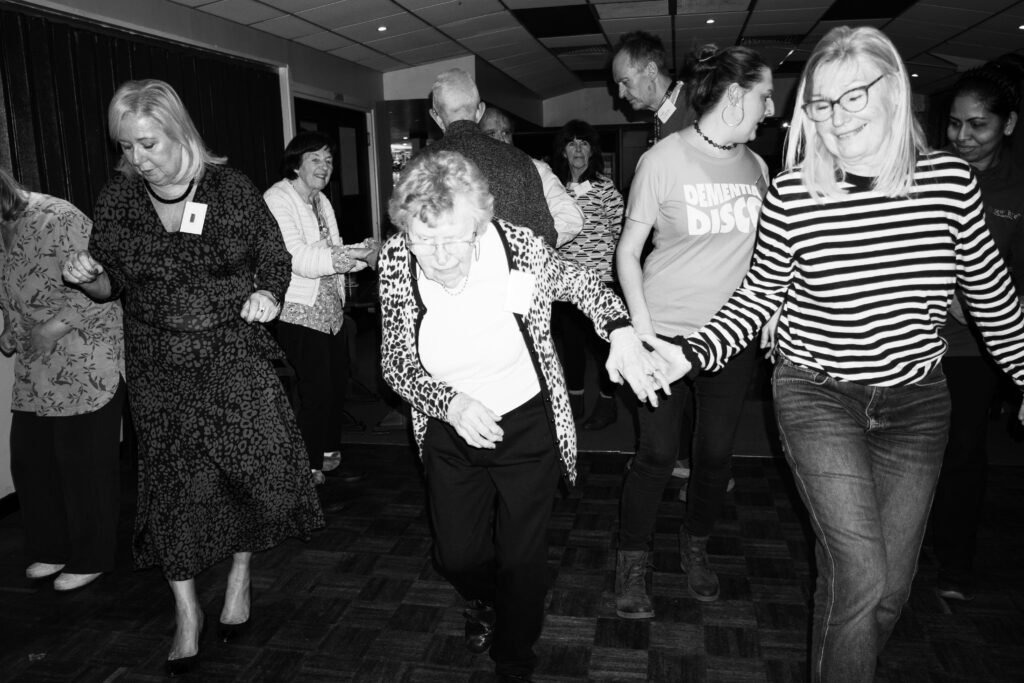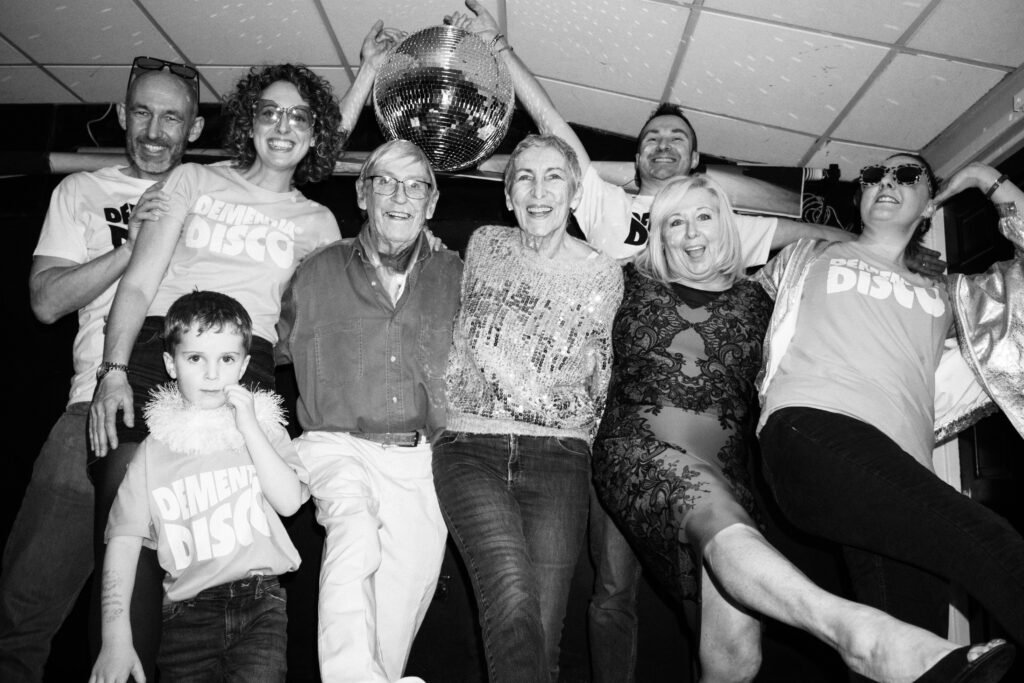When Kate Darby’s dad was diagnosed with Alzheimer’s at just 66, she found herself in rooms that didn’t quite fit.
“They were playing war tunes around the piano,” Kate recalls. “My dad would just look at me and go, ‘Why am I here?’ He wasn’t interested in Vera Lynn or dominoes. He wanted to be dancing in his kitchen to Bruce Springsteen.”
It’s a sentiment that sparked something powerful — and now, just a few years later, Dementia Disco is a thriving charity lighting up evenings across Greater Manchester, giving people living with dementia — and their families — a place to let loose, feel joy, and be seen.
A Night Out for Everyone
Dementia Disco was born in 2019, founded by Kate, her brother Nick, and their friend Phil — all of whom had personal experiences with loved ones living with dementia.
That first event was held at a local Conservative Club in Stockport, with the venue offered free of charge by someone whose own father had dementia. A home-cooked hotpot was served, the music played, and 40 people showed up to dance. “We didn’t know if anyone would actually dance,” Kate laughs, “but the dance floor was packed. It was magical.”

What made their idea different was simple: timing and community. “Every dementia support group we found happened during the working week,” says Kate. “That meant carers had to take time off, and the rest of the family couldn’t be involved. We wanted something at the weekend, in the evening — a real night out.”
Music, Memory, and Movement
Each disco is carefully designed to feel like a genuine night out. Held in familiar, accessible venues like social clubs, there’s food, name badges, a raffle, and of course — the music. “We started off with a playlist of top 100 tracks from the 50s to the 80s,” Kate says, “but now we’ll play anything — Ed Sheeran, Taylor Swift, ABBA, Motown, line dancing, Elvis. You name it.”
And it works.
“You see people arrive a little unsure, maybe quiet, and then the music starts. You see smiles, people singing who usually don’t speak much, people dancing who’ve maybe not moved like that in years.”

The disco has hosted attendees across generations — young carers, adult children, grandchildren, friends. There’s even an 80-something-year-old woman called Sally with dementia who used to teach line dancing — and still leads routines at the events.
“She’s forgotten so much,” Kate says, “but she still remembers every step.”
Growing a Movement
When the pandemic hit, the team didn’t stop. They moved their discos online via Zoom and kept the energy going with fortnightly virtual parties. Post-lockdown, the events came back stronger. Their original Stockport disco reached full capacity, and a second opened in Cheadle Hulme. A third launched in Poynton earlier this year. “We had 85 people at that one in September,” Kate beams.
Kate now works full-time as the charity’s CEO — a position made possible through successful funding applications. “When we started applying for funding, it was actually quite straightforward,” she says. “There really wasn’t anything else like it, especially not running on weekends.”
Now, the team is developing a social franchising model — a “run-your-own-disco” toolkit — that will allow volunteers across the country to set up their own local events. “It’s not a business franchise,” she clarifies. “We’re a registered charity. But we want to give people everything they need — from training to T-shirts — to make it happen in their own towns.”
She’s already piloting this model with a group in Wimbledon and has had interest from as far as Liverpool.
The Impact
The feedback from families speaks volumes. “We’ve had people tell us their loved ones sleep better after the discos, that it reduces stress, that they feel less isolated,” says Kate. “You can just see the effect. There’s something incredibly powerful about the combination of music, memory, movement, and community.”
Manchester University is now partnering with the charity on research to scientifically measure that impact.
“There’s this thing called ‘sundowning,’” Kate explains — a symptom of dementia where individuals can become more agitated in the early evening. “Having a place to go, something engaging, physical — it actually helps reduce that agitation and helps people sleep better. It helps carers, too. It gives them a break or a chance to enjoy an evening out with their loved one.”
Some carers even stay home while a family member or friend takes their loved one to the disco — a rare and valuable moment of respite.
A Bright Future
Looking ahead, Kate’s vision is ambitious and hopeful.
“We’d love to see a dementia disco in every town,” she says. “That’s the dream. And we think the model we’ve built can do it — with the right support, the right people, and the right energy.”
She’s careful to mention that it’s not always easy. Funding in the charity sector is tough, especially as you grow. “But we’ve got something unique. And the people who come, who dance, who smile — they remind us why we’re doing this.”
In a world that often sidelines older adults and those living with dementia, Dementia Disco is flipping the script — proving that joy, music, and community are for everyone.
Even better with a little glitter.
To learn more about Dementia Disco or to get involved, visit www.dementiadisco.org.





















